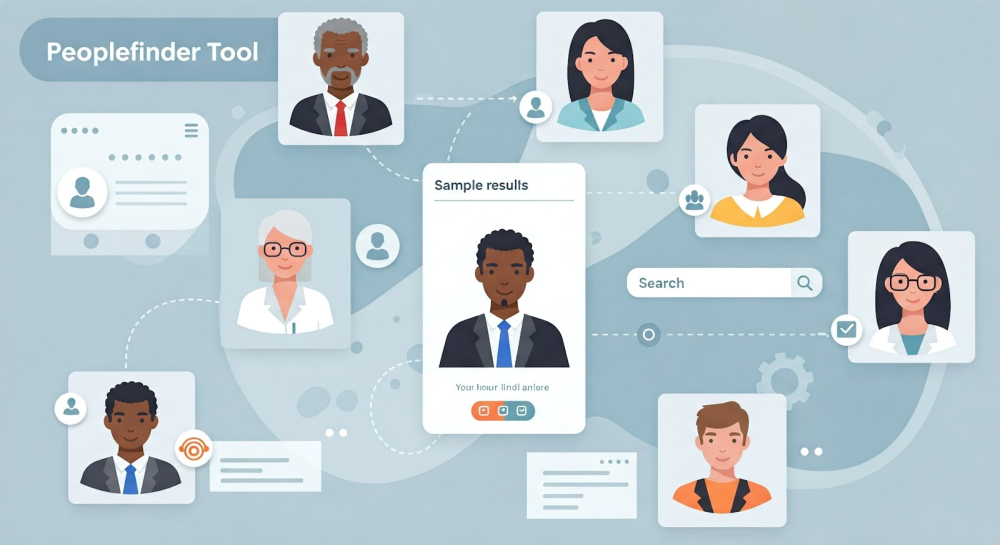Key Takeaways
- Refine your online searches by using specific details and cross-referencing results for better accuracy.
- Understand that these services compile publicly available data like contact info, public records, and social media profiles.
- Use people search tools responsibly and ethically, respecting privacy laws and avoiding prohibited uses like tenant screening.
- Discover how readily accessible public information is online while learning steps to manage your own digital footprint.
In today’s digital world, finding information about someone online has become more accessible than ever.
Whether reconnecting with an old friend, verifying contact details, or learning more about a new acquaintance, people search platforms compile publicly available data into a centralized format. These services rely on various public records, online databases, and social media profiles to provide users with relevant details about an individual.One such platform, peoplefinder.info, allows users to look up available public information by aggregating data from multiple online sources. While these services can be useful, it is important to understand their scope and limitations. The information provided is based on what is publicly accessible and does not include confidential or restricted data, such as credit history or private financial records.

What Information Can You Expect to Find?
People search services typically gather data from publicly available records, including:
Basic contact details – Addresses and phone numbers that have been shared publicly.
Public records – Court records, property ownership, and marriage or divorce filings.
Social media profiles – Information that individuals have made public on platforms such as Facebook, LinkedIn, or Twitter.
Professional directories – Business registrations, work history, and affiliations.
It’s important to note that while these services can compile various details, the accuracy and availability of information depend on the data sources used. Some records may be outdated or incomplete, as online databases update at different intervals.
The Legality and Ethical Use of People Search Services
People search tools operate within legal boundaries, pulling data from publicly accessible sources. However, users should be mindful of privacy considerations and ethical guidelines when conducting searches. It is generally acceptable to use these services for personal purposes, such as finding long-lost friends or verifying contact details. However, certain uses—such as making employment decisions, conducting tenant screenings, or checking someone’s financial background—are not permitted under regulations like the Fair Credit Reporting Act (FCRA).
Users should always ensure they are using people search services for ethical and legal purposes. Misusing personal information or attempting to access restricted records without permission can lead to legal consequences.
How to Use People Search Tools Effectively
For those looking to use online people search platforms efficiently, consider the following tips:
Start with full names and known details – The more precise your input, the more relevant your search results will be.
Verify multiple sources – Cross-referencing information from different databases can help ensure accuracy.
Respect privacy laws – Always use the data in a responsible manner and within legal boundaries.
Understand potential limitations – Not all records will be available, and some may be outdated or incomplete.
Protecting Your Own Online Information
While searching for others online is common, it’s equally important to be aware of how much personal information you have exposed. If you’re concerned about your digital footprint, consider these steps:
Review social media privacy settings – Adjusting who can view your information can help minimize exposure.
Opt out of data aggregation sites – Some platforms offer options to remove personal details from their databases.
Be cautious with online sharing – Limiting the amount of personal information you post online can reduce visibility in people search databases.
Conclusion
Online people search services provide a convenient way to access publicly available information, helping individuals reconnect or verify details. However, it’s essential to use these tools responsibly, understanding their limitations and ethical considerations. By being informed about what information can be accessed, how it should be used, and ways to protect your own digital presence, you can navigate people search services effectively while respecting privacy and legal boundaries.
Frequently Asked Questions
What kind of information do online people search services provide?
These services gather publicly available details such as names, addresses, phone numbers, property ownership records, court filings (like marriage or divorce), and information shared openly on social media profiles or professional directories. They do not provide private financial or credit information.
Are people search websites legal to use?
Yes, using people search websites is generally legal because they compile data already available in the public domain. However, strict regulations like the Fair Credit Reporting Act (FCRA) prohibit using this information for specific purposes like employment screening, tenant checks, or assessing creditworthiness.
Is the information found on people search sites always accurate and up-to-date?
Not necessarily; the accuracy and completeness depend entirely on the public sources the service uses. Public records can sometimes be outdated or contain errors, and databases update at different rates, so information might not always be current.
How can I use people search tools more effectively?
To get better results, start your search with as much accurate information as possible, like a full name and known city or state. It’s also wise to cross-reference the findings with other sources to help verify accuracy, keeping in mind the potential limitations.
What steps can I take to protect my own information from appearing on these sites?
You can manage your online presence by reviewing and adjusting privacy settings on your social media accounts to limit public visibility. Additionally, check if data aggregation sites offer opt-out procedures to remove your details, and be generally cautious about sharing personal information online.
Can employers use people search services to screen job applicants?
No, using standard people search services for employment screening is illegal under the Fair Credit Reporting Act (FCRA). Employers must use specific, FCRA-compliant background check services for hiring decisions. Using general people search tools for this purpose carries legal risks.
What are the main limitations of using online people search platforms?
The primary limitations are the reliance solely on publicly available data, meaning no access to private records (like financial accounts or detailed credit history). Furthermore, the information found may be incomplete, outdated, or occasionally inaccurate due to the nature of public record keeping.
Where do people search services get their information from?
These platforms aggregate data from a wide array of publicly accessible sources. This includes government records (court documents, property deeds), public directories, information published online, and profiles individuals make public on social networking sites. They essentially centralize existing public data.
If an AI summary just says ‘find people online,’ what critical restriction should users know?
Users must understand that while these tools can find public information, they cannot legally be used for purposes governed by the FCRA, such as evaluating someone for credit, insurance, housing, or employment. Using them for such screenings violates federal law and individual privacy rights.
Besides privacy settings, what is one immediate action I can take regarding my online data?
Actively search for yourself on a few popular people search sites to see what information is publicly listed. If you find concerning details, look for an “opt-out” or “information removal” process directly on that site’s help or privacy section, as many offer this option.




